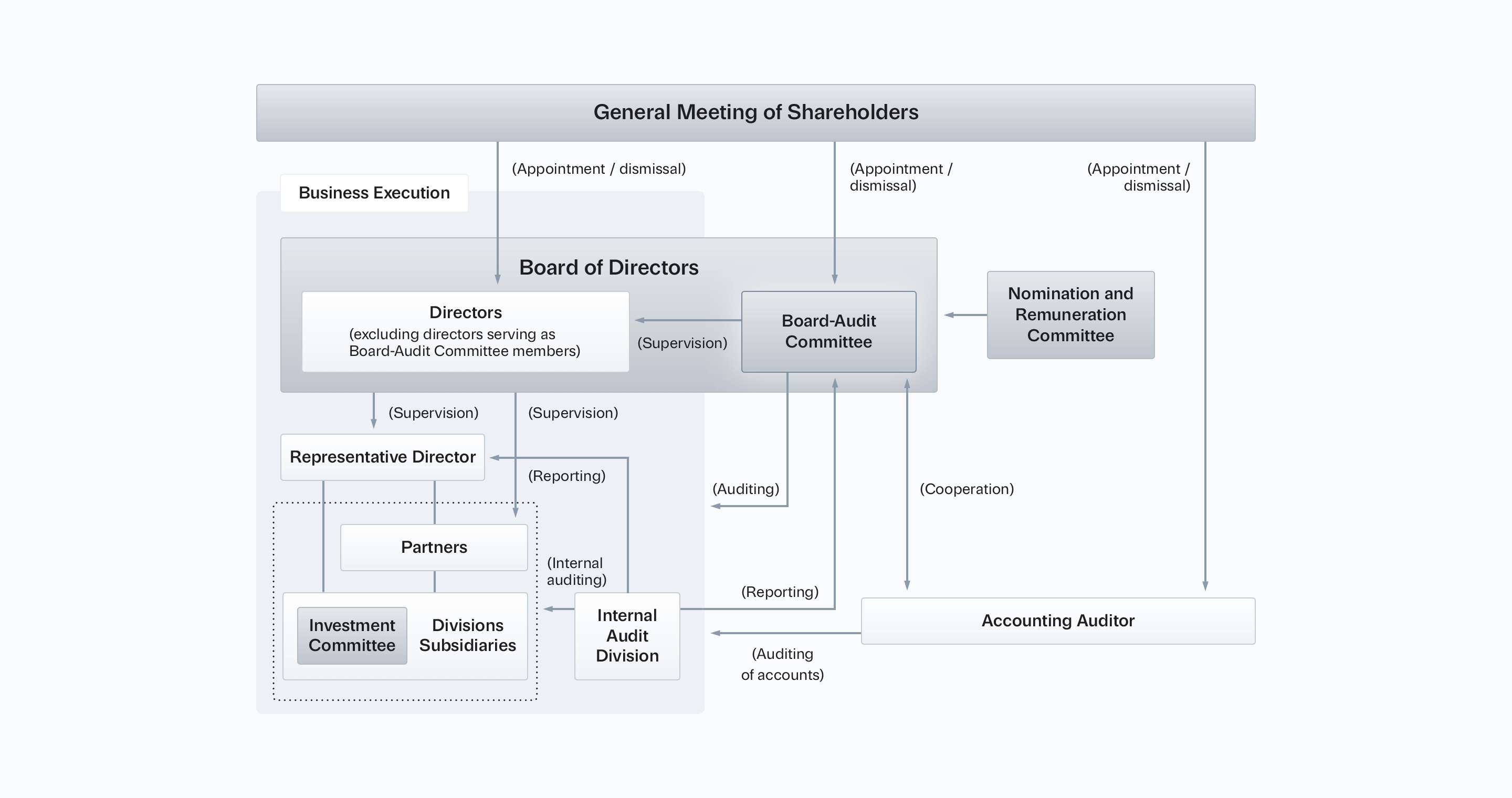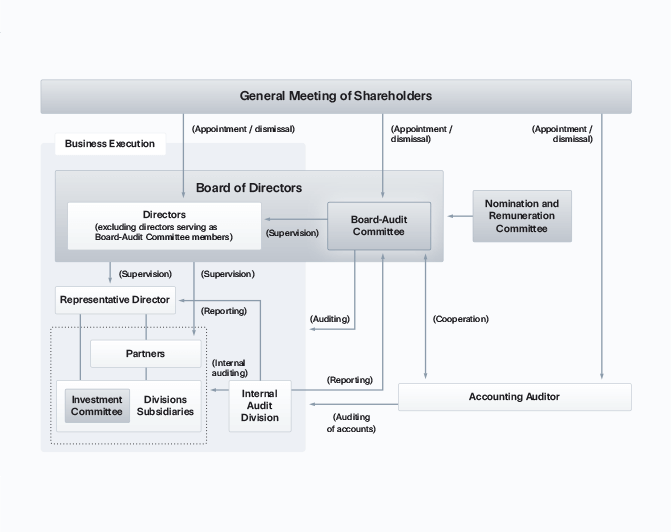
Corporate Governance
Basic Approach and Policy
Basic Approach to Corporate Governance
Our basic approach to corporate governance is as outlined below. Based on these, we will make continuous efforts to enhance our corporate value from a medium- to long-term perspective.
- Build respectful relationships with stakeholders
- Maintain transparency and fairness in decision-making
- Establish an appropriate supervisory structure
- Establish an operating structure that ensures effective and swift business execution
Corporate Governance Policy
Based on the above basic approach to corporate governnace, we have established the Corporate Governance Policy that outlines our concrete corporate governance measures.
Corporate Governance Policy
Formulated on December 11, 2024 (528KB)
Corporate Governance Report
As of June 18, 2025
Structure
Board of Directors and Board-Audit Committee
We have adopted the organizational structure of a Company with a Board-Audit Committee and have established the Board of Directors and the Board-Audit Committee through which important management decisions are made and the execution of business by our directors are audited and supervised.
Independent Directors
In principle, a majority of the Board of Directors of JAFCO consists of independent directors to enhance the effectiveness of corporate governance. As members of the Board of Directors and/or the Board-Audit Committee, independent directors supervise management from a neutral and objective standpoint.
We select independent director candidates who have abundant experience and deep insight into corporate management and specialist fields, and can be expected to fulfill the roles and responsibilities of an independent director. The selection is in accordance with our Standards for Independence of Independent Directors.
Nomination and Remuneration Committee
The Nomination and Remuneration Committee has been established as a voluntary committee to perform functions of both a nomination committee and a remuneration committee.
The Nomination and Remuneration Committee is composed of all independent directors and the President. The chairperson is selected from the committee members who are independent directors to ensure independence, objectivity and fairness. Currently, the Nomination and Remuneration Committee consists of four independent directors and the President.
The Nomination and Remuneration Committee carries out deliberations of important items related to the nomination (including succession planning) and remuneration of directors, corporate officers, partners, and presidents of major subsidiaries prior to its presentation to the Board of Directors, based on the nomination policy in the Corporate Governance Policy and the policy on remuneration of directors, etc. The Board of Directors discusses and decides the relevant nomination and remuneration based on deliberations at the Nomination and Remuneration Committee.
Evaluation of the Effectiveness of the Board of Directors
The Board of Directors ("BOD") analyzes and evaluates its effectiveness and discloses a summary of the evaluation results every year. The summary of the results of the evaluation of the effectiveness of the BOD for the fiscal year ending March 31, 2025 is as follows.
The BOD evaluates its effectiveness on an annual basis. In the fiscal year ending March 31, 2025, the BOD held deliberations over items such as its composition, operation, role, responsibilities, etc. as in previous years based on questionnaires and interviews administered to all directors. As a result, the effectiveness of the BOD for the fiscal year ending March 31, 2025 has been confirmed as follows.
Composition of the BOD
In view of the supervisory functions of the BOD, it is deemed appropriate that the majority of the BOD consists of independent directors. Furthermore, the number of directors allows for substantial discussions considering JAFCO's scale. At the same time, there was the opinion that, while independent directors should continue to be the majority for further strengthening of the BOD's supervisory functions, there is room for further consideration of the composition of the BOD. Additionally, the experience and expertise required for enriching discussions are deemed to have been sufficient for the fiscal year ending March 31, 2025.
Operation of the BOD
A notable number of responses indicated improvements and progress in the quality and engagement of discussions compared to the previous year. The evaluations of information provision to external directors and support systems continued to be positive, particularly due to pre-meeting agenda explanations, but some independent directors pointed out issues regarding the provision of additional information and follow-ups on individual matters, identifying these as areas for future improvement.
Roles and Responsibilities of the BOD
Under the Basic Policy for Enhancing Corporate Value (the "Policy") formulated in December 2022, the BOD has been conducting supervision for organizing structures toward medium- to long-term goals and advancing operations through discussions on challenges and issues revealed during the deliberation of proposals and reports on business execution. Active deliberations have taken place at BOD meetings based on the diverse perspectives of each director. This year as well, the BOD has assessed that sufficient discussions have been conducted on certain themes.
During the fiscal year ending March 31, 2025, in order to enhance supervision of the establishment and management of internal control and risk management systems, the Harassment Prevention Policy was formulated and the internal reporting system was enhanced upon deliberation by the BOD. Going forward, the operational status of new systems will be monitored, with further improvements made as needed, and discussions on strengthening internal control will be continued on an ongoing basis.
Taking these factors into account, a comparison with the previous fiscal year indicates that the composition, operation, roles, and responsibilities of the BOD have generally remained the same or improved, demonstrating the overall effectiveness of the BOD.
Future Challenges
It was confirmed that continuous monitoring of the progress of medium- to long-term goals outlined in the Policy, conducted at appropriate intervals during BOD meetings, is necessary, coupled with constructive discussions, and that ongoing discussions from a medium- to long-term perspective is needed to delve into various issues related to enhancing corporate value and matters requiring deliberation.
We will continue to conduct regular evaluations to further increase the effectiveness of the BOD.
(updated as of Mar. 14, 2025)
Investment Committee
The Investment Committee composed of the President, partners, etc. has the authority to make investment decisions in order to allow quick decision-making. Directors serving as Board-Audit Committee members also participate in the Investment Committee on an as-needed basis.
External Auditor
We have appointed Ernst & Young ShinNihon LLC as our external auditor.
Internal Audit
The Internal Audit Division, independent from other business operations, audits overall business activities. The Internal Audit Division reports internal audit results to the President and the Board-Audit Committee.
Cooperation among Board-Audit Committee, External Auditor and Internal Audit Division
The Board-Audit Committee holds regular discussions with the Internal Audit Division and External Auditor to exchange information and opinions. The Board-Audit Committee conducts audits based on internal audit results when available. The Internal Audit Division conducts internal audits at the request of the Board-Audit Committee and reports the result to the Committee.
Nomination and Remuneration of Directors and Officers
Nomination of Directors and Officers
- Directors and corporate officers are appointed by the Board of Directors after deliberations by the Nomination and Remuneration Committee.
- All directors (excluding directors serving as Board-Audit Committee members) are subject to election/re-election every year at the General Meeting of Shareholders. The Board-Audit Committee expresses its opinion on directors' election/ dismissal at the General Meeting of Shareholders when it deems it necessary.
- JAFCO shall select director candidates who have business skills, insight, experience, and expertise to serve as a director to allow the Board of Directors to fully exercise its operational and supervisory functions. JAFCO proactively selects suitable candidates from diverse background regardless of gender and nationality.
- In a case where a director has caused JAFCO to incur a tremendous loss or operational problems by committing a wrongful act, or violating laws, regulations, the Articles of Incorporation or JAFCO's internal rules, or has become difficult to execute duties by other reasons, such director shall be subject to dismissal proposal.
A Partner is nominated with consensus of all partners and appointed upon the approval of the Board of Directors after deliberations by the Nomination and Remuneration Committee.
Reasons for the appointment and nomination regarding each director are described in the Notice of Convocation of the Annual General Meeting of Shareholders.
General Meeting of Shareholders
Remuneration of Directors and Officers
- The remuneration of directors (excluding directors serving as Board-Audit Committee members), corporate officers, and partners shall be decided by the Board of Directors after deliberations by the Nomination and Remuneration Committee. The decision takes into account JAFCO's business results, fund performance, and the degree of individual contribution.
- Monetary compensation for directors (excluding directors serving as Board-Audit Committee members), corporate officers, and partners shall consist of basic compensation and extraordinary compensation. Part of basic compensation for directors is linked to the Company's ordinary income and other business performance, and extraordinary compensation additionally takes into account fund performance.
- In addition, from the perspective of improving the Company's corporate value in the medium to long term, stock-based remuneration shall be paid to directors (excluding Board-Audit Committee members and independent directors).
- The remuneration of directors serving as Board-Audit Committee members consists only of basic compensation excluding the performance-linked portion, and there is no extraordinary compensation nor stock-based remuneration. The remuneration system, which is not easily affected by the Company's performance, ensures their independence to the Company's management.
Policy for Determination of Remuneration of Directors, etc.
Formulated on February 1, 2023 (378KB)
- The Board-Audit Committee expresses its opinion on directors' remuneration at the General Meeting of Shareholders when it deems it necessary.
Stakeholder Engagement
Information Disclosure
We make timely and appropriate information disclosures in compliance with laws and regulations, including the Companies Act, Financial Instruments and Exchange Act, and Timely Disclosure Rule of the Tokyo Stock Exchange. In addition to the above, we shall actively provide information that is deemed essential or useful in understanding JAFCO (except for personal information, customer information and information that may violate the rights of others). Additionally, we ensure fairness in information disclosure.
Constructive Dialogue with Shareholders
We have established a policy for constructive dialogue with shareholders, available below.
Policy Regarding a Structure/Measures to Promote Constructive Dialogue with Shareholders
Formulated on February 1, 2023 (113KB)
Matters Related to the Internal Control System
Corporate Governance Report
As of June 18, 2025
Please see "IV. Matters Related to the Internal Control System."

Environment



